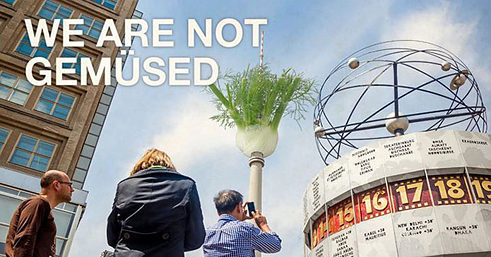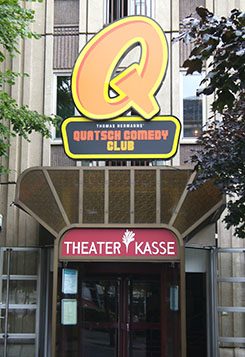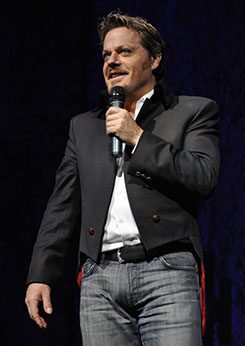Bicultural Urbanite Brianna
A Berliner and an Expat walk into a Pub

Germans don’t exactly have a reputation for stand-up comedy. But that’s not to say they don’t know how to make each other laugh. Germany enthusiastically embraced the anything-goes chaos of cabarets in the early twentieth century and since then has produced countless clowns, comic musicians and other satirical entertainers.
These days, even stand-up comedy has found its place in the comedy landscape – particularly in Berlin. The city’s English language stand-up scene has taken off over the past decade and it’s not just native speakers who are throwing their hats into the ring.
I attended my first English language stand-up show in Berlin at the Kookaburra Club back in 2007. My friends and I were primed for some quality laughs, but were quickly disappointed by the American and Australian comics who trotted out a selection of dick jokes and trite observations about how Berliners are grumpy and the city is covered in dog shit. There was also a German comic whose routine included stuffing his mouth with ping pong balls and miming to a song while theatrically clutching his balls to reach the high notes. We left during intermission.
THE X(PAT) FACTOR
 The Quatsch Comedy Club in Berlin.
| Creative Commons Attribution – Share Alike 3.0 Germany
Berlin’s stand-up scene has come a long way since then. The Quatsch Comedy Club in Mitte provides a platform for professional comedians such as Cindy aus Marzahn, a fictional character reminiscent of Kim from Kath & Kim, and Anke Engelke, who starred in the award-winning sketch show Ladykracher. At the grassroots level, an influx of young migrants from around the world has injected new energy and variety into the local stand-up scene. Many of the comics perform in English, although not all are native speakers. This multicultural mob hail from countries as diverse as Russia, India and, of course, Australia.
The Quatsch Comedy Club in Berlin.
| Creative Commons Attribution – Share Alike 3.0 Germany
Berlin’s stand-up scene has come a long way since then. The Quatsch Comedy Club in Mitte provides a platform for professional comedians such as Cindy aus Marzahn, a fictional character reminiscent of Kim from Kath & Kim, and Anke Engelke, who starred in the award-winning sketch show Ladykracher. At the grassroots level, an influx of young migrants from around the world has injected new energy and variety into the local stand-up scene. Many of the comics perform in English, although not all are native speakers. This multicultural mob hail from countries as diverse as Russia, India and, of course, Australia.The shows have a rough and ready vibe and are frequently staged in cellars, nightclubs or back rooms of pubs. Dozens of open mic nights encourage would-be comics to have a crack and enable more experienced hands to road test their new material. And there’s clearly an audience for this style of humour. On any given night there are at least two or three English stand-up or improv comedy events drawing wry smiles and belly laughs around the city. Guests are often lubricated with a shot of cheap booze upon entry and one regular show also lures punters with the promise of free pizza. The performances can be a bit hit and miss, but then that’s not uncommon when you throw a rag-tag bunch of semi-professional comedians together on one stage.
HUMOUR IS HUMAN
Despite the scene’s international flavour, surprisingly little material is lost in translation. As renowned British comedian Eddie Izzard told The Local, while there are definitely different styles of comedy in every country, humour is human – not national. Izzard performs in English, French and Spanish, and recently added German to his repertoire. While workshopping his latest show in Berlin he found that German and English audiences both laugh at the same parts of his routine – despite the fact that Germans often have to wait until the end of the sentence for the all-important verb to be revealed. According to Izzard, as long as comedians avoid references that are unique to their hometown or country, good material should be well received no matter where they’re performing (or what language they’re using).THE GERMAN COMEDY AMBASSADOR
 British comedian, actor, writer and political activist Eddie Izzard.
| Creative Commens Attribution 3.0 Unported (CC BY 3.0)
Despite the dominance of English language comedy in the Western world (and the running joke that Germans lack a sense of humour), Germany has actually produced its fair share of sketch shows, sitcoms and late night talk shows. There’s even a German mockumentary series called Stromberg (inspired by The Office) and a satirical news show called Die Heute Show (a clear nod to the USA’s The Daily Show). Yet, so far it would appear that Germany has only successfully exported one stand-up comic. London-based Henning Wehn is the UK’s self-appointed German Comedy Ambassador. When asked by The Telegraph about Germany’s supposed deficiencies in the humour stakes, he swiftly debunked the myth: “If you go into a pub in Germany or the UK people will laugh with the same intensity at the same jokes. It’s rather that stand-up comedy and the humour industry as a whole is much better developed in the UK.”
British comedian, actor, writer and political activist Eddie Izzard.
| Creative Commens Attribution 3.0 Unported (CC BY 3.0)
Despite the dominance of English language comedy in the Western world (and the running joke that Germans lack a sense of humour), Germany has actually produced its fair share of sketch shows, sitcoms and late night talk shows. There’s even a German mockumentary series called Stromberg (inspired by The Office) and a satirical news show called Die Heute Show (a clear nod to the USA’s The Daily Show). Yet, so far it would appear that Germany has only successfully exported one stand-up comic. London-based Henning Wehn is the UK’s self-appointed German Comedy Ambassador. When asked by The Telegraph about Germany’s supposed deficiencies in the humour stakes, he swiftly debunked the myth: “If you go into a pub in Germany or the UK people will laugh with the same intensity at the same jokes. It’s rather that stand-up comedy and the humour industry as a whole is much better developed in the UK.”While Germany still has a way to go before it can compete with heavyweights of the international stand-up scene, Berlin’s thriving comedy community is certainly doing its bit to boost the local industry. Regular nights like The Last Stand, We Are Not Gemüsed and Laughing Spree help to fan the flames; and the Comedy Café in Neukölln even organises an annual Berlin Fringe Festival. So next time you’re in town, add ‘comedy show’ to your alphabetised must-do list. It’ll fit in nicely between ‘Berghain’ and ‘currywurst’.